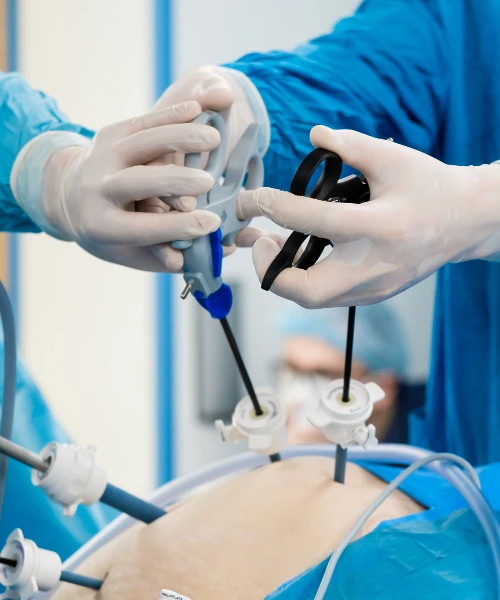Laparoscopic Ovarian Cyst Removal at Radhika Women’s Care
Ovarian cysts are fluid-filled sacs that can develop on the ovaries, often causing symptoms like pelvic pain, bloating, irregular periods, or discomfort during intercourse. While many cysts resolve on their own, some may need surgical removal if they are large, persistent, painful, or suspicious. At Radhika Women’s Care, we offer safe and minimally invasive laparoscopic surgery for ovarian cyst removal, ensuring effective treatment with minimal downtime.
This advanced keyhole procedure allows our surgeons to remove the cyst through tiny incisions while preserving the healthy part of the ovary. It is especially ideal for women who wish to maintain fertility and avoid the discomfort and recovery time associated with open surgery.
With expert gynecologic surgeons, state-of-the-art technology, and a patient-focused approach, we ensure precise treatment, faster recovery, and personalized care in a hygienic and compassionate environment
Benefits of Laparoscopic Ovarian Cyst Removal
Laparoscopic surgery is the most preferred and advanced approach for treating ovarian cysts. Here’s why:
Minimally Invasive: Performed through tiny incisions—less pain and faster healing.
Preserves Fertility: The cyst is removed while keeping the ovary intact, which is important for women planning future pregnancies.
Quick Recovery: Most patients resume normal activities within a few days.
Cosmetic Advantage: Small scars that fade over time, leaving minimal or no visible marks.
Short Hospital Stay: Usually a daycare or 24-hour stay procedure.
Lower Risk of Complications: Less tissue trauma and bleeding than traditional open surgery.
Safe for All Age Groups: Suitable for both young and older women with symptomatic or complex cysts.
Post-Operative Care After Laparoscopic
Ovarian Cyst Removal
After surgery, a few simple steps ensure smooth and speedy recovery:
Pain Management: Mild abdominal or shoulder discomfort from gas may occur; take prescribed medications as directed.
Wound Care: Keep incision sites clean and dry. Avoid applying creams or powders unless advised.
Diet: Start with soft foods and gradually resume a normal diet. Drink plenty of water.
Activity: Light walking is encouraged. Avoid heavy lifting, strenuous activity, and sexual intercourse for 1–2 weeks or as advised.
Rest & Sleep: Adequate rest supports healing. Use extra pillows to stay slightly elevated while sleeping, if needed.
Follow-Up Appointments: Return for review to discuss the surgery findings, biopsy (if done), and confirm complete healing.

Get an appointment
Get treatment for all your mental healthcare needs.
Consult our expert doctors for safe, effective, and personalized laser treatments. Your health and comfort are our priority at Radhika Women’s Care.
FAQ

When is ovarian cyst removal necessary?
Surgery is advised when the cyst is large, painful, persistent, or if there’s a concern for twisting (torsion) or malignancy.
Is laparoscopic surgery painful?
The procedure is done under general anesthesia, and most patients experience only mild pain after surgery, easily managed with medications.
Will I lose my ovary?
No. In most cases, only the cyst is removed (cystectomy), and the healthy ovary is preserved—especially for women who wish to conceive.
How soon can I get back to work or routine activities?
Light activities can be resumed in 2–3 days. Full recovery typically takes about a week.
Can ovarian cysts come back?
Yes, new cysts can form in the future depending on your hormonal balance. Regular follow-up and ultrasound scans are advised.







